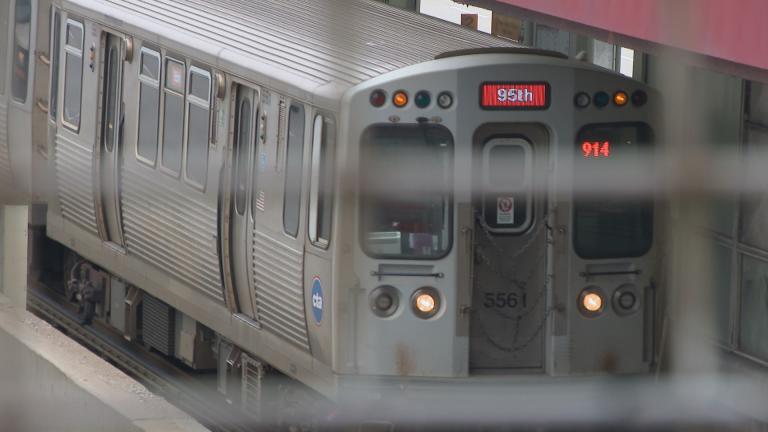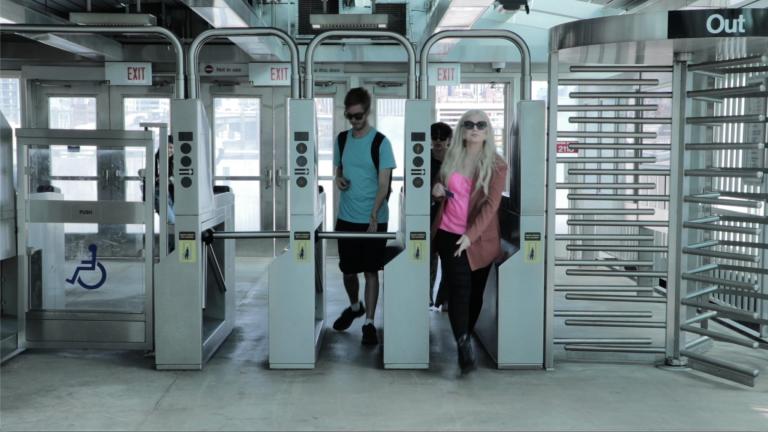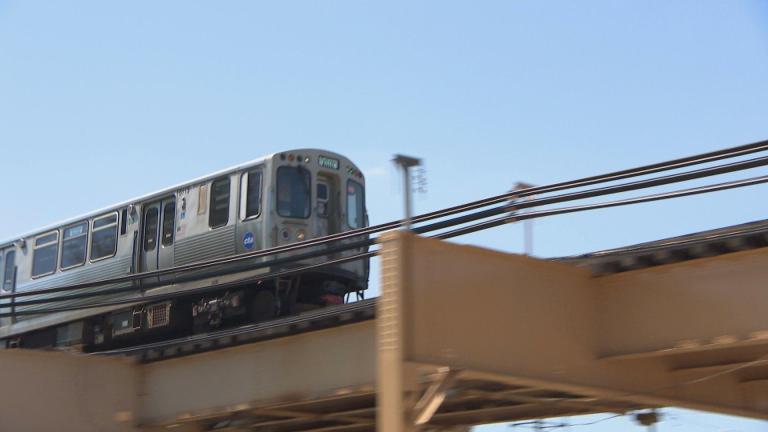The Chicago Transit Authority issued a correction for years worth of data it had provided to WTTW News, after the transit agency discovered the records did not accurately reflect the hours worked by bus and train operators.
The revelation came just hours after publication of a story about the CTA’s failure to provide 2023 data within the 10-day timeline set forth in the state’s Freedom of Information Act — a timeline the agency chronically violates, according to information on FOIA response times obtained by a local transit advocate.
“When your taxpayer dollars fund something, you should be able to analyze the same data that the organization does so that you can make your own conclusions,” said advocate Nik Hunder, who requested and analyzed the response time data and shared it with WTTW News.
Record-Keeping Confusion
WTTW News filed a request in January of this year for data on how many hours each bus and train operator was paid for in 2023, the latest in a series of stories about the budgetary, safety and policy implications of the transit agency’s reliance on overtime. While employees earn time-and-a-half for overtime, WTTW News requested 2023 information in the same format as prior years, which the CTA said multiple times did not include the so-called “OT multiplier” and allowed for a clear analysis of the long hours some operators put in on the job.
Just hours before a deadline to offer comment for a planned story based on 2023 operator hours, a CTA spokesperson provided written statements and information — but said the information provided this year contained the OT multiplier, despite the request for information in the same format as previous years. The agency said it would work to provide corrected information, without the OT multiplier, but did not offer a timeline to produce the records.
Two weeks later — hours after WTTW News published a story about the agency’s failure to provide the corrected records — a CTA spokesperson provided 2023 data on operator hours in the same format as previous years.
But that data came with a major caveat. The spokesperson revealed that the issue with the first batch of 2023 data was not that it contained the OT multiplier, but that it contained a retention incentive that was coded as work hours.
The second batch of data provided still contained the OT multiplier — and, the spokesperson said, so had every other set of work hour records the CTA provided WTTW News over the past two years, despite multiple assurances that the records only included a straight-time accounting of work hours, PTO and breaks.
The CTA’s error means that the agency caused operator hours to appear artificially inflated in already-published WTTW News reports covering the years 2015 through 2022.
The CTA was eventually able to provide corrected information for all the years WTTW News previously requested, which the agency says now reflects only the hours worked, and no longer has the overtime multiplier or things like vacation, bereavement time or training.
“We have identified what happened and have since outlined measures to ensure any similar data is properly and consistently processed to ensure accuracy,” the CTA said in its statement, adding that the mistakenly calculated hours were not replicated in other datasets.
“CTA uses a proprietary time-keeping system that requires employees to use their CTA-issued IDs to tap in/out for their scheduled assignments/shifts,” the agency said. “Any work that is registered outside of an employee’s picked schedule will be flagged for management review/approval to further validate that the employee is not in violation of any work rules … CTA operations managers use this system (to) help keep track of employee availability, scheduling, over-time/payroll costs, and more on a daily, weekly and monthly basis.”
Different Data, Similar Trends
The corrected work hours would have painted a less dire picture about the CTA’s reliance on overtime than earlier reporting showed, had the transit agency caught its error when WTTW News filed its first request for detailed information on operator hours two years ago.
But the updated data still indicates a public transit system grappling with a pool of bus and train operators that shrank dramatically after the onset of the coronavirus pandemic, and the potential for dangerously long hours for workers putting in the most time on the job.
The largest group of employees in each year worked an average of 30 to 40 hours per week. But that group has shrunk significantly from 2015, when 51.6% of operators fell into that category, to 34.8% of operators last year.
At the same time, the cohort of employees working an average of 40 hours per week or more rose from 8.7% in 2015 to a peak of 21.2% in 2022. A handful of them put in extremely long average weeks, between 60 and 80 hours — a handful that grew larger as the years passed. In 2015, just two employees worked 60 to 70 hour average weeks. In 2022, that number rose to 39 operators who worked an average of 60 to 80 hours weekly, before falling to 22 in 2023.
And since those numbers are calculated based on dividing employees’ total number of work hours for the year by 52 weeks, and the corrected dataset doesn’t include vacation or other time off the job, that means some actual workweeks were even longer.
The CTA’s use of overtime comes with health and safety concerns for workers in demanding jobs like bus and rail operators, and worries from employee advocates about burnout. Experts say long hours and short turnaround time can cause sleep deprivation and fatigue. Under current CTA rules, employees are only required to have eight hours off between shifts.
“CTA’s practice … does not give the employees the opportunity to receive enough uninterrupted sleep to be fully alert and operate safely,” the National Transportation Safety Board wrote in a report after a 2014 Blue Line crash in which the operator fell asleep at the controls.
While the CTA attempted to increase the turnaround time to 10 hours, the agency previously told WTTW News the unions representing bus and train operators rejected that plan.
The agency said in addition to eight hours between shifts, operators can’t work longer than five and a half hours without a 30-60 minute break, and said they must complete federally mandated sleep apnea and fatigue training.
“Every effort is made to provide a safe work and travel environment, while also offering opportunities to pursue additional income,” the CTA said.
The agency also noted that under the agreement with the unions representing bus and train workers, operators can’t work longer than 13 hours unless “requested by management in emergency circumstances and the employee does not exhibit signs of fatigue; or in instances in which the employee has completed their scheduled and/or OT shift, but must stay on CTA property for administrative purposes (i.e., meeting with management or filling out reports).”
Slow FOIA Response Times
Public bodies in Illinois have five business days to reply to a FOIA request, and may extend the deadline another five days under several scenarios spelled out in the law. The CTA has never within memory responded to a FOIA request from WTTW News within the legally required timeline.
Other news organizations, as well as advocates like Hunder, have also faced chronic delays, which prompted Hunder to file a request for data showing how long it took the CTA’s FOIA office to respond to every query it received in 2023.
His analysis found that, between Jan. 1 and Nov. 30 of last year, the CTA answered just 94 of 880 FOIA requests within 10 days — meaning just over 10% came within the legally mandated time frame. The median response time was 23 business days.
Hunder also found the fastest response times were to for-profit businesses, law firms and insurance companies.
“That might be due to the nature of the request, which usually involves security footage,” he said. “But it’s strange to see a group receive theirs faster than anybody who could hold them accountable, whether that’s journalists, activists, nonprofits — it’s concerning that there is a different timeline, intentional or not.”
“CTA’s FOIA Dept. is responsible for responding to all FOIA requests within pre-set statutory timeframes regardless of volume or staffing levels,” an agency spokesperson told WTTW News in a statement. “Non-commercial requests, which are on a shorter statutory timeframe for response, are prioritized over commercial requests that are on longer statutory response deadlines.”
The CTA said its FOIA department added one employee last year, and that it currently has four full-time staffers, a project specialist who aids both FOIA requests and Law Administration, and a temporary paralegal who’s a contract employee.
“CTA is pursuing options to supplement FOIA function staffing with temporary contract staff,” the agency said. “Additionally, in certain circumstances, staffing will be supplemented with the support of available staff from CTA’s Law Dept.”
Despite the delays, the agency told both WTTW News and Hunder it was committed to thorough and transparent responses.
But Hunder noted that the data he received showed more than 200 still-unfulfilled requests filed as far back as January 2023.
“I would like to see them reduce (response) times so that there is trust that the system works,” he said. “For an agency that is already under a lot of scrutiny, and then they don’t reply or answer your request for days on end, it further erodes that trust.”
Contact Nick Blumberg: [email protected] | (773) 509-5434 | @ndblumberg







